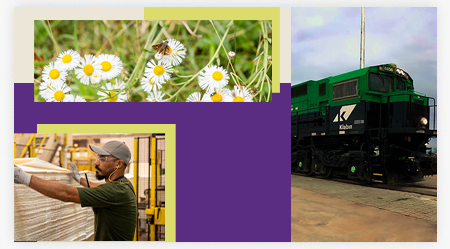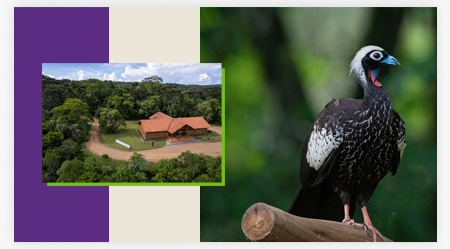Glossary
Biomass: all organic matter of plant or animal origin used for the purpose of producing energy
Bio-oil: a black liquid obtained through the pyrolysis process, in which biomass is subjected to high temperatures in an isolated environment with little or no oxygen. It is mainly used as a fuel for heating and the generation of electrical energy
Brazilian Association of Business Communication (Aberje): the main national reference center in the production and dissemination of knowledge and business communication practices
Brazilian GHG Protocol Program: program created in 2008, responsible for adapting the GHG Protocol method to the Brazilian context and for developing calculation tools for greenhouse gas emission estimates
Carbon Footprint: a measure that calculates the equivalent carbon emissions in the atmosphere by a person, activity, event, company, organization, or government
CDP: international non-profit organization that analyzes and recognizes the efforts of companies worldwide to manage the environmental impacts of their activities
Circular economy: an economy that, with the goal of reducing waste, keeps materials and products in circulation for as long as possible, either by using recyclable, recycled, compostable, and/or biodegradable materials, or by improving product design, as well as processes and business models
CO2eq: carbon dioxide equivalent is the unit for converting all greenhouse gases (GHGs) in terms equivalent to the amount of as if they were CO2, considering their planet-warming potential. The result of multiplying the tons of GHG emissions by their global warming potential
Dow Jones Index Score: classification obtained by companies participating in the Dow Jones Sustainability Index (DJSI) selection, which answer to an extensive questionnaire (specific to each sector). The questions, based on predetermined criteria, have different weights, resulting in an overall company score that determines its inclusion in the index
Dow Jones Sustainability Index (DJSI): a global indicator of financial performance, launched in 1999 as the first indicator of the financial performance of leading companies in sustainability at a global level
European Union Deforestation-Free Regulation (EUDR): regulation that prohibits the import and trade within the European bloc of products derived from certain commodities—cattle, soy, palm oil, coffee, cocoa, timber, and rubber—that originate from areas deforested after December 31, 2020
GHG: greenhouse gases; gases such as hydrofluorocarbons (HFCs) and perfluorocarbons (PFCs), used in aerosols and refrigerators, carbon dioxide (CO2) and methane (CH4), that absorb part of the sun’s rays and redistribute them in the form of radiation in the atmosphere, heating the planet in a phenomenon called the greenhouse effect
IFC/IPCC: Intergovernmental Panel on Climate Change; created by the United Nations Environment Program (UN Environment) and the World Meteorological Organization (WMO), that aims to provide policy makers with regular scientific assessments of climate change, its implications and possible future risks, as well as propose adaptation of damage mitigation policies
International Accounting Standards Board (IASB): the international non-profit organization that publishes and updates the International Financial Reporting Standards – IFRS
International Financial Reporting Standards (IRFS): accounting standards issued by the IFRS Foundation and the International Accounting Standards Board
Life Cycle Assessment: a technique developed to assess the environmental impact of products, wich consists analyzing the environmental effects associated with productive activities throughout the entire life cycle of the product
Low-carbon technologies: processes, equipment, systems, and resources that aim to reduce the emission of greenhouse gases, such as carbon dioxide (CO2)
MOVER (Racial Equity Movement): movement formed by 47 Brazilian companies that intend to work on the structures that perpetuate inequality in the country, breaking patterns and providing equally possible achievements for all
RPPN: acronym for Natural Heritage Private Reserve; a category of private domain conservation unit (UC) that, without affecting the ownership of the property, helps protect biodiversity in Brazilian biomes, contributing to the expansion of protected areas in the country
Sexual harassment: a single act or repeated action in which a person, who may be a woman or a man, is embarrassed, by a hierarchical superior or by another person who has some type of ascendancy inherent to the exercise of the position, with the intention of obtaining sexual advantage or favor
Tag along: a mechanism for protecting minority shareholders, which guarantees them the right to leave a company if the company's control is acquired by an investor that was not previously part of the Company
TNFD (Task Force on Nature-related Financial Disclosures): a global initiative that provides recommendations and guidance for financial organizations and businesses to understand and disclose the impact of their activities on nature
UN's Global Compact: initiative promoted by the United Nations (UN) to engage companies and organizations in the adoption of ten universal principles in the fields of Human Rights, Labor, Environment and Anticorruption Practices, to develop actions aimed at addressing society’s challenges
Unit: also known as a Stock Certificate, is a package of shares traded on the stock exchange, composed of one common share and four preferred shares
Water Footprint: an indicator that measures and analyzes the volume of freshwater used throughout the entire production chain of a consumer good or service
Water-Secure Management: a set of practices that enable the proper guidance of land use and other natural resources with the aim of producing environmental goods and services without affecting the soil and water






